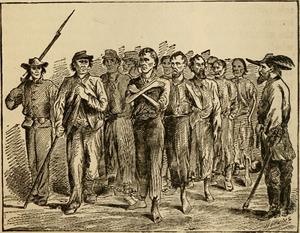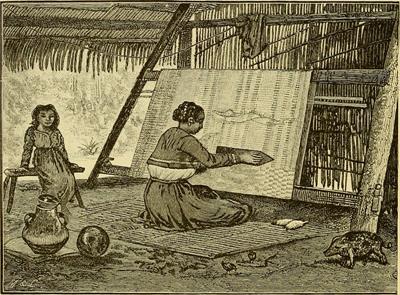
PUMPA - SMART LEARNING
எங்கள் ஆசிரியர்களுடன் 1-ஆன்-1 ஆலோசனை நேரத்தைப் பெறுங்கள். டாப்பர் ஆவதற்கு நாங்கள் பயிற்சி அளிப்போம்
Book Free Demo5. Oppression (1765-1835)
(Scene 1: Indians at jail)
Narrator: But the British continued to oppress Indians. In 1818, they had passed Regulation III. Under it, an Indian could be jailed without trial in a court.
(Scene 2: Three Britishmen can be seen enjoying their party)
Narrator: All the time British officers in India drew big salaries and also made fortunes in private business.
(Scene 3: Exporting goods)
Narrator: By 1829, Britain was exporting British goods worth seven crore rupees to India.
Narrator: The British prospered on the Company’s loot while Indian industries began to die.
(Scene 4: The life of Indian weavers)
Narrator: Governor-General Bentinck reported back home –
Bentinck: “The bones of cotton weavers are bleaching the plains of India.”
Explanation:
The Britishers continued to trouble Indians in different ways by putting them in jail. They gave sufferings and struggles for Indians by passing a new law called Regulation III. The Regulation III act was passed in the year 1818. The main motive of implementing this law was to put the Indians in jail without producing them in front of the court. The Regulation act was taken place illegally to torture the Indians. The Britishers knew that if the Indians were brought before the court, they would escape in the form of justice. So the Britishers cunningly passed the Regulation III act.

The Britishers treated Indians as a slave and put them in bars
As they continued to suppress Indians, they created all sorts of favourable things to improvise their officers and belongings. As a result, the British officers drew enormous salaries from their bank, and they invested money in new business. Later on, they had found good profits in their new business too.

The Britishers earned enormous money in their new business
The Britishers were exporting goods in huge quantities from Britain. By 1829, they were importing goods worth seven crore rupees to India. As a result, the Britishers grew richer and more prosperous, leaving the Indian industries poor. In the end, the Indian industries collapsed entirely and started to fall.
Later on, governor-general Bentinck stated to Britain that "The bones of cotton weavers are bleaching the plains of India". This means that the cotton weavers were forced to starve because of the Britishers' cotton mills. They produced much cheaper cloth with the help of machines that led the traditional Indian handicrafts to extinction. This was the reason behind the traditional workers losing their weaving jobs.

Indian weavers lost their jobs due to the Britishers' cotton mills
Meanings of the difficult words:
| S.No | Words | Meanings |
1 | Oppress | Keep someone under the control by force |
2 | Fortune | A large amount of money or assets |
3 | Prospered | Succeed in material terms; be financially successful |
4 | Loot | Private property taken from an enemy in war |
5 | Implementing | Put a decision, plan or agreement into effect |
6 | Improvise | Produce or make something from whatever is available |
Reference:
National Council of Educational Research and Training (2008). Honeydew. Glimpses of the Past-S.D.Sawant(pp. 36-49). Published at the Publication Division by the Secretary, National Council of Educational Research and Training, Sri Aurobindo Marg, New Delhi.
https://commons.wikimedia.org/wiki/File:Brazil,_the_Amazons_and_the_coast_(1879)_(14783014832).jpg